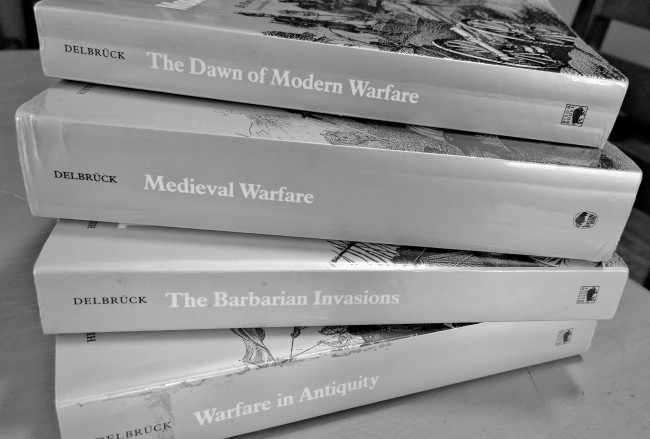
Why should military historians care about Hans Delbrück? Like it or not, the legacy of Delbrück as a military historian is still strong even 85 years after his death.
Before we get into that, consider some of the praise heaped upon him by other military historians, dubbing him as
- “the first modern military historian” – Arden Bucholz ((Arden Bucholz, Delbrück’s Modern Military History (Lincoln: University of Nebraska Press, 1997), 1.))
- “the great German military historian” – Victor Davis Hanson, ((Victor Davis Hanson, Carnage and Culture: Landmark Battles in the Rise of Western Power (New York: Anchor Books, 2002), 166.)) David Levering Lewis ((David Levering Lewis, God’s Crucible: Islam and the Making of Europe, 570-1215 (New York: W. W. Norton & company, 2008), 173.))
- “the great military historian” – Donald Alexander Downs and Ilia Murtazashvili ((Donald Alexander Downs and Ilia Murtazashvili, Arms and the University: Military Presence and the Civic Education of Non-Military Students (Cambridge: Cambridge University Press, 2012), 298.))
- “a great pioneer military historian” – John Keegan ((John Keegan, The Face of Battle (New York: Penguin, 1978), 31.))
- “the greatest nineteenth-century military historian” – Eliot A. Cohen and John Gooch ((Eliot A. Cohen and John Gooch, Military Misfortunes: The Anatomy of Failure in War (New York: Vintage Books, 1991), 38.))
- “one of the greatest of all military historians” – R. C. Smail ((R. C. Smail, Crusading Warfare, 1097-1193, 2nd ed. (Cambridge: Cambridge University Press, 1995), 8.))
- “perhaps the greatest of modern military historians” – Michael Howard ((Michael Howard, The Causes of Wars, 2nd ed. (Cambridge: Harvard University Press, 1983), 191.))
- “perhaps the greatest master in the history of warfare” – J. F. Verbruggen ((J. F. Verbruggen, The Art of War in Western Europe During the Middle Ages: From the Eighth Century to 1340, 2nd ed., trans. Sumner Willard (Woodbridge: The Boydell Press, 1997), 2.))
There are more, but it starts to get redundant. As for Delbrück’s work, historians believe it
- was “a bold first step in the direction of a more sophisticated and scholarly brand of military history” ((John E. Jessup, Jr. and Robert W. Coakley, A Guide to the Study of Military History (Washington: Center of Military History, 1988), 78.))
- is “the classic work” in the study of war ((Theodore Ropp, War in the Modern World (Baltimore: The Johns Hopkins University Press, 2000), 11.))
- “revolutionized the study of ancient and medieval warfare” ((Stephen Morillo and Michael F. Pavkovic, What is Military History?, 2nd ed. (Cambridge: Polity, 2013), 35.))
- “should be required reading for all military historians” ((Brian Todd Carey, e-mail message, October 23, 2013.))
Any historian may be content with his peers using “great” and “first” to describe his legacy, but in this case, the names behind the praise include prominent figures such as Michael Howard, the late John Keegan, and Victor Davis Hanson.
If that is not impressive enough, in 2012 West Point listed Delbrück alongside Clausewitz, Sun Tzu, and Thucydides in its Top Ten Military Classics, making him the only twentieth-century historian to receive such a recognition.
Yet with all this appreciation, understanding and quantifying Delbrück’s influence on the military history field becomes difficult, as most historians are content simply to heap on lofty praise and then move onto the next topic.
For now, we will do the same and provide a deeper look at Delbrück’s influence on current military historiography in the next article.
